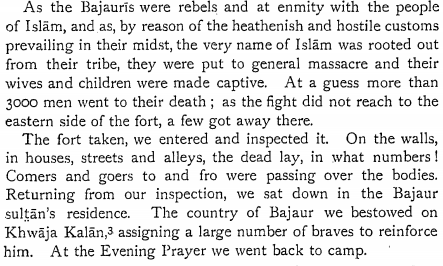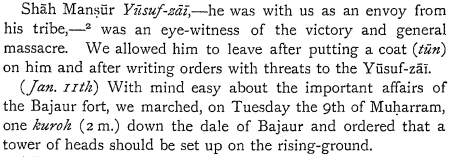Historical Context clarifies the Significance of Ayodhya Verdict
One needs to look at every occurrence in context of time and space. As the updates of Ayodhya Verdict kept trickling in on November 9th from the court, I could not but go back in time and feel what someone in that era when Aurangzeb or Babur raped and pillaged India may have. And the significance of what happened overwhelmed me. What was accomplished seemed like a pipe dream of a hallucinating mind just a couple of hundred years ago. Or even 20 years ago.
Let us go down that history and those times, when this nightmare started when unmitigated inhuman evil visited this land.
A glimpse of the evil to come
The imperial invasion of India started with Mohammad Bin Qasim in the 7th century. Qasim was a man from Ta’if in today’s Saudi Arabia. He not only subjugated Persian areas, including Shiraz but also came all the way to Sindh.
He demolished several temples and desecrated many. As per Manan Ahmed Asif in his book – “A Book of Conquest”,
“Qasim first asserts the superiority of Islam over the polytheists by committing a taboo (killing a cow) and publicly soiling the idol (giving the cow meat as an offering)”
What started then in terms of attacking, humiliating, pillaging, and demolishing the local culture, spiritual and economic heritage has continued to this day when temples are demolished and desecrated on a regular basis in Pakistan, Bangladesh and even in India.
One such temple was the Ram Janmabhoomi temple. Ram, as a being, icon, inspiration and deity was deeply intertwined into the cultural and spiritual ethos of India.
Mongols/Moghuls/Mughals – Monsters and Evil unleashed on India
After Muhammad Bin Qasim, the door opened up for the worst evil to unleash monstrous genocides on India.
Babur, who was the direct descendant of Timur (or Tamerlane) through his father and Genghis Khan through his mother, a lineage of of the greatest monsters that humanity had ever seen, attacked India.
Timur in his own lifetime killed 17 million human beings, which was 5% of the world’s population of that time. Genghis Khan killed 40 million human beings, which was 11% of the world’s population. Between them, these monsters killed over 15% of the world’s population!
All that with just swords and spears!
Babur was no less. He had a passion for beheading humans and making pillars out of human heads. Here is one extract from his own rendering of his time – Baburnama – which you can download and read at the bottom of this post.


Such was the monstrosity unleashed on the world by this family.
And this monstrous streak in this lineage of inhuman creatures ran throughout their history. One ruler who is often touted as the “Akbar the Great” had the following accomplishments. And he started with the beheading of Hemchandra Vikramaditya (Hemu) when he was brought unconscious with an arrow in his eye after the war.
- After the war with Maharana Pratap, he killed 8000 Rajput warriors and 40,000 civilians (including children). Besides over 300 women killed themselves in Jauhar to save themselves from the unbelievable torture of becoming sex slaves, while 10,000 men were taken as slaves by Akbar’s men. (“Akbar the Great Moghul”, Vincent Smith)
- As per Akbar nama, on September 2, 1573, Akbar killed 2000 people in the area that is today called Ahmedabad city and built a tower of 2000 heads after beheading the dead!
- In 1564, he destroyed a city in Gondavana state with a population of 50,000 and killed thousands while Rani Durgavati had to kill herself to save her dignity.
You see, when a person with such a psychopathic record is the best that this lineage could give to the world, then you can imagine the evil that had visited the land of India.
Many brave and enlightened beings wiped out
On December 8, 1705, Mata Gujri (81 years) and Zarowar Singh (9 years), and Fateh Singh (7 years) were captured by a general of Aurangzeb, Nawab Wazir Khan. After 4 days on December 12th, the two young guys were walled alive in one of the most gruesome ways after they had been kept in a cold tower in the middle of extreme winters.
On learning the fate of her grandsons, Mata Gujri could not stand the pain and died as well. Their bodies were thrown outside of the fort wall and lay there out in the open until one kind soul Seth Todar Mal of Sirhind performed the last rites.
Mata Gujri was the mother of Guru Gobind Singh and Zorawar and Fateh Singh, the Guru’s sons.
On hearing the fate of his sons and mother, the Guru remarked,
“Such a tragedy will not go unnoticed in God’s Court. Like this weed, the Mogul Raj will be uprooted.”
Guru Gobind Singh lost all his sons in his battle with the evil personified as a madman, Aurangzeb, who had earlier killed his father Guru Tegh Bahadur in the most gruesome way.
Many years before this mind-numbing tragedy, when Aurangzeb’s forefather, Babur unleashed his madness on India, Guru Nanak Dev, a remarkable being cried out in pain, in what are known as Baburvani.
Lord, Thou takest Khurasan under Thy wing, but yielded India to the invader’s wrath.
Yet thou takest no blame;
And sendest the Mughal as the messenger of death.
When there was such suffering, killing, such shrieking in pain, Didst not Thou, 0 God, feel pity ?
Although it is said that Babur met Guru Nanak, but given how the whole clan behaved and kept up the demonic traditions of Genghis Khan, as we discussed above, it is unlikely that Baba Nanak had any impact on Babur.
During the entire Moghul/Mughal rule, remarkable beings and fighters like Rani Durgavati, Chatrapati Shivaji, Maharana Sangha, Maharana Pratap, Guru Arjan Dev, Guru Hargobind, Guru Tegh Bahadur, Guru Gobind Singh – fought the evil that the Mughals unleashed on India. Maharana Sangha and Guru Nanak Dev personally saw the evil brought upon by Babur.
However, despite the amazing power, resilience and strength of these beings, the evil of Islamic and genocidal power of the Mughals and what it did in India was difficult to stop or reverse.
Remember, there was a time, in India’s subcontinent, when beings like Shivaji and Guru Gobind Singh were fighting Aurangzeb and yet they died without ending the evil that that mad-man wrecked on India.
Imagine the frustration and the hopelessness of the Indian soul of that time.
Today, 490 years later, a major change is being witnessed. Ayodhya verdict revitalized the soul of a nation.
Modi does what legions of remarkable beings could not
Times change, ways change, rules change, morals and laws change. Even the greatest of evils come face to face with the power of time.
As India embarked on a remarkable journey of democracy and law, an ethos was constructed where the rule could no longer be usurped by power and genocide. Despite the attempts by people like Nehru (who showed high intolerance as critics like Majrooh Sultanpuri were jailed for mere criticism) and Indira Gandhi who unleashed emergency, the urge of Indians to take the power in their hands brought an unprecedented shift in the consciousness of the nation.
A nation that had hitherto been dictated by the Mughal evil minds, British colonizers who milked the nation dry and killed with impunity, and then those who wanted to subjugate Hindu ethos to ensure their rule; got a voice due to social media.
This democratic crescendo of diverse voices via social media brought a man to the top, whose time had come – Narendra Damordardas Modi.
The Ayodhya Verdict
After the remarkable action of abrogation of Article 370 and 35A, which was undertaken with the full force of law and legislative backing, the change in the direction and reinstating of Shri Ram’s shrine in Ayodhya was paved by the Indian judiciary.
The ethos that has underlined Modi’s presence and dissolution of the under-current that propped up the ways which undermined the inherent Indian ethos has resulted in diverse actors and beings making decisions that were unimagined just a few hundred years ago, by even the most remarkable humans who set foot on this planet!
Modi did not give the Ayodhya verdict, five justices of the Supreme Court did. Unanimously. But Modi’s presence and the change in the national ethos ensured that a decision happened, which touched the latent consciousness of this land.
Unshackling of India’s spiritual heritage was imminent. It had been shackled for far too long. For, beyond the ups and downs of rulers and kingdoms and laws and genocides, is a consciousness that remains unblemished and unchanging.
Ram was a manifestation of that consciousness. And, that can never be shackled or undermined.
When Guru Gobind Singh was alone in the forest separated from his sons and mother, with pain in his heart, and loftiness of his spiritual understanding, he shared the timeless, eternal truth.
He said – in time this world and existence comes into being and ends as well. All of which happens within and as a manifestation of that one eternal consciousness. One that I (said Dasham Guru) consider my Guru. One, to whom I bow down in Namaskar. This eternal consciousness gives the bliss of Shiva’s one-ness to one who attains to Shiva, and it is the one which destroys the enemies in moments. (also read Spiritual Significance of Guru Gobind Singh’s Benti Chaupai)
ਜਵਨ ਕਾਲ ਸਭ ਜਗਤ ਬਨਾਯੋ ॥ ਦੇਵ ਦੈਤ ਜੱਛਨ ਉਪਜਾਯੋ ॥ ਆਦਿ ਅੰਤਿ ਏਕੈ ਅਵਤਾਰਾ ॥ ਸੋਈ ਗੁਰੂ ਸਮਝਿਯਹੁ ਹਮਾਰਾ
Javan kaal sabh jagat banaio. dev dait jachhan upjaayo. aad ant eikai avtaaraa. soee guru samjhiyaho hamara
ਨਮਸ਼ਕਾਰ ਤਿਸ ਹੀ ਕੋ ਹਮਾਰੀ ॥ ਸਕਲ ਪ੍ਰਜਾ ਜਿਨ ਆਪ ਸਵਾਰੀ ॥ ਸਿਵਕਨ ਕੋ ਸਵਗੁਨ ਸੁਖ ਦੀਯੋ ॥ ਸ਼ੱਤ੍ਰੁਨ ਕੋ ਪਲ ਮੋ ਬਧ ਕੀਯੋ ॥
Namaskaar tis hee ko hamaaree. sakal prijaa jin aap savaaree. sivkan ko sivgun sukh dee’o. satran ko pal mo badh kee’o.
The Dasham Guru was so correct.
Featured Image by Umesh Ravani
Baburnama
[pdf-embedder url=”https://drishtikone.com/wp-content/uploads/2019/11/baburnama017152mbp.pdf” title=”Baburnama”].




Comments ()